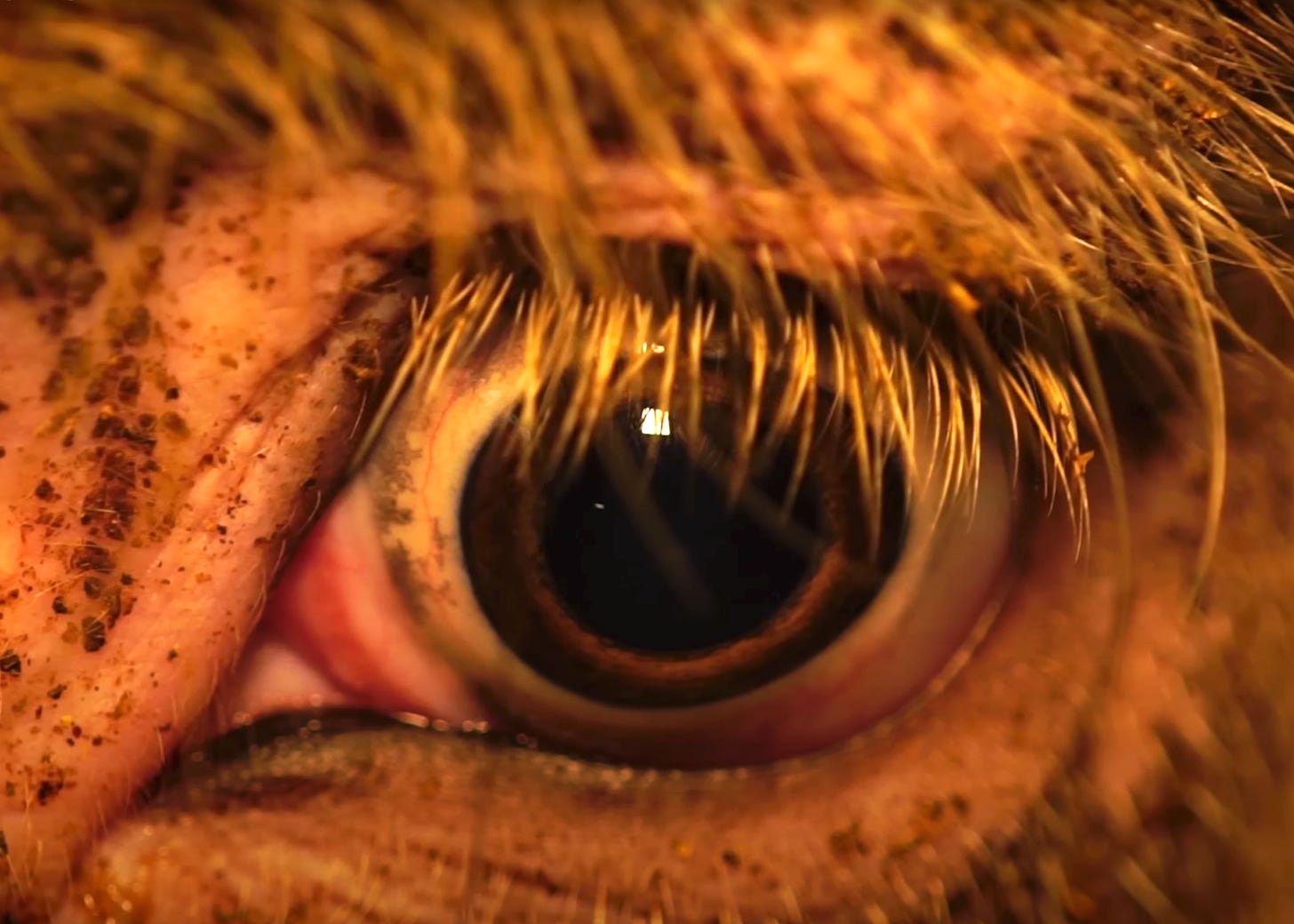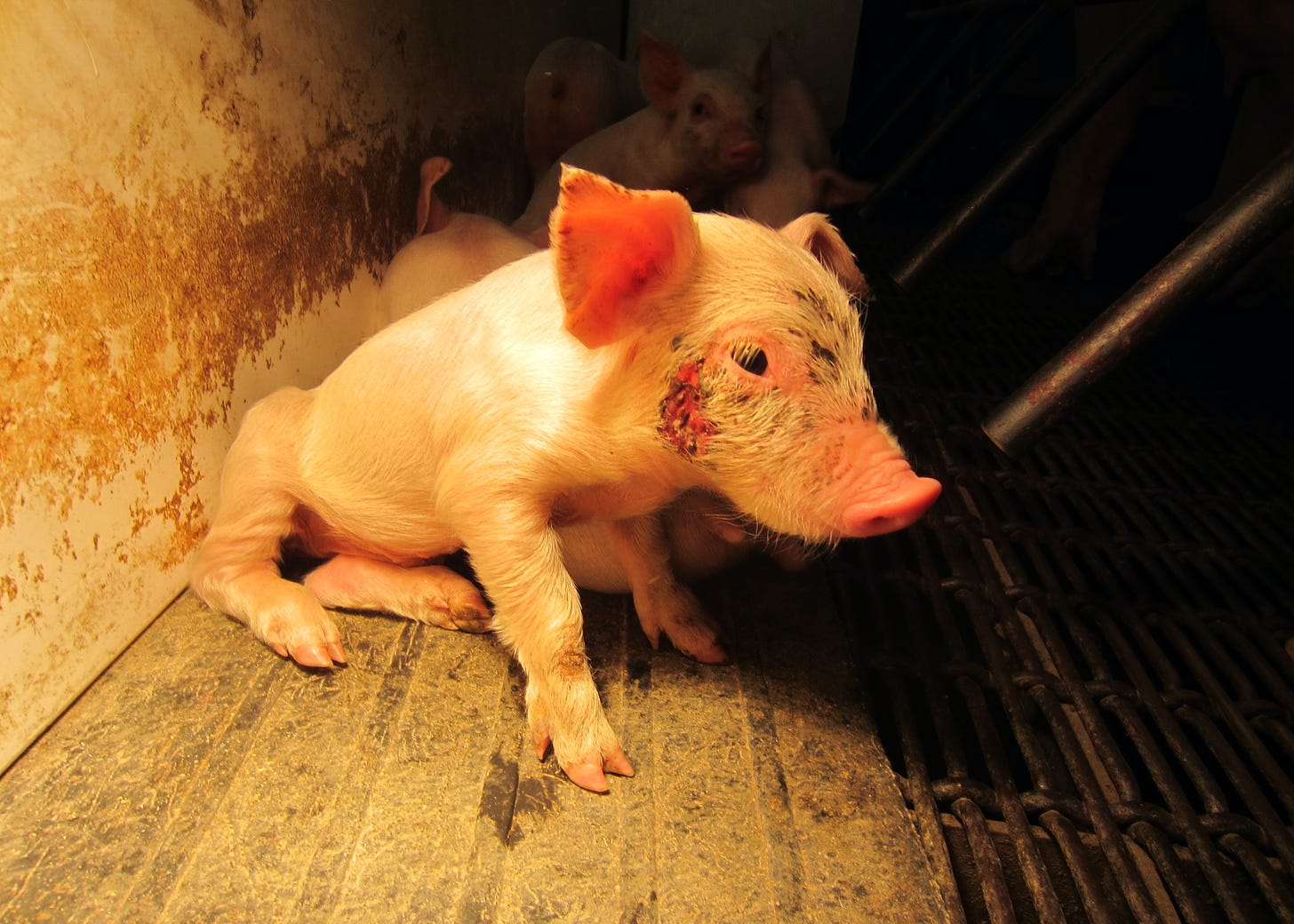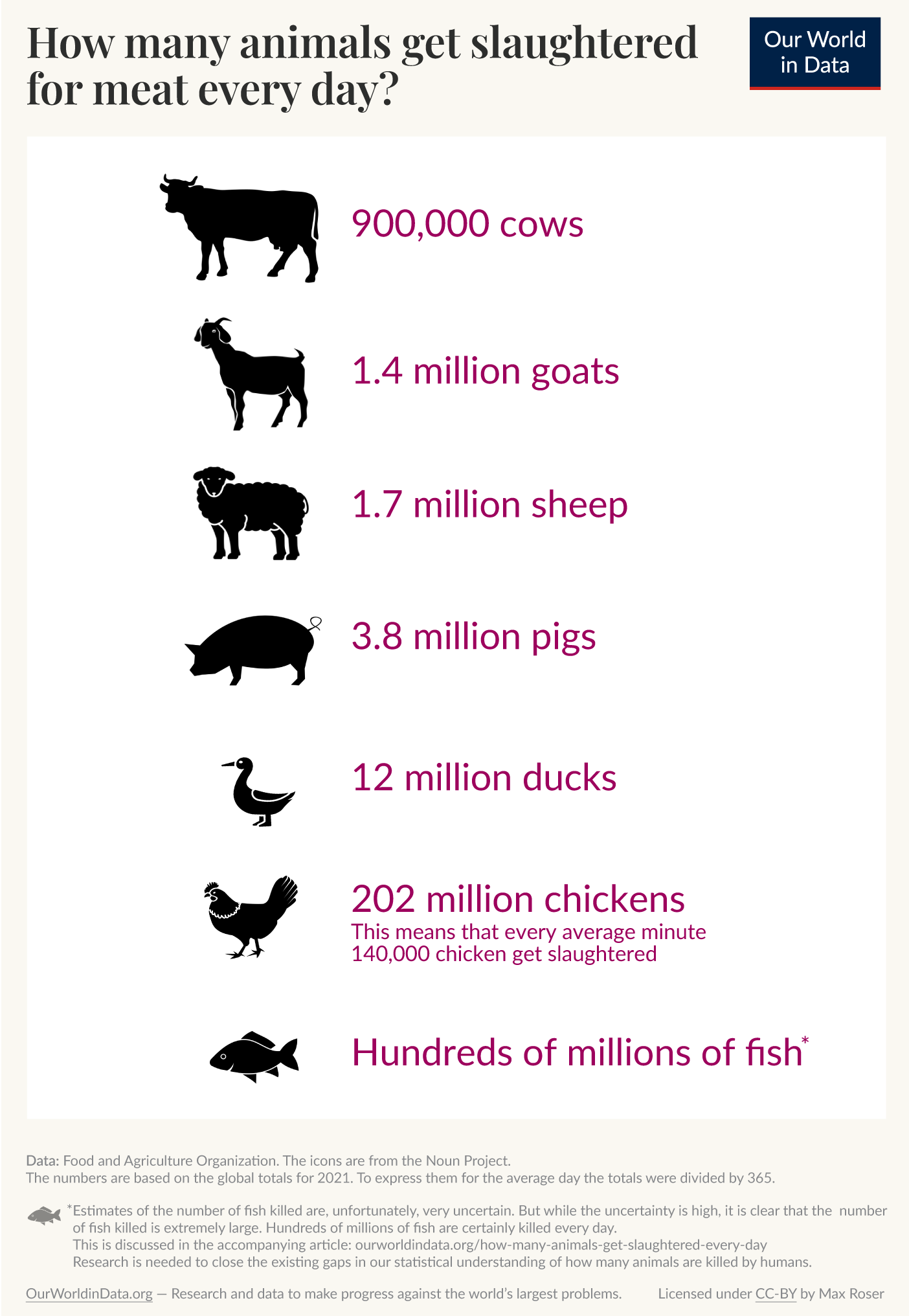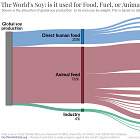Livestock Farming Is the Biggest Source of Suffering in the World
A harrowing reality we can no longer ignore

When we think about the suffering in the world, images of war, poverty, natural disasters, famines, and disease often come to mind.
And hell, I’m not here to trivialize these things.
Clearly, they can bring horror and misery beyond belief; dimensions of suffering that — if you knew — you would never wish on your worst enemies.
It may sound preposterous, but I’m here to talk about something even worse.
Something that certainly creates more suffering and misery than all the above. Possibly even more than all the above taken together.
We have created hell on Earth
You’ve already seen it in the title: I’m referring to the livestock sector.
And no, I’m not exaggerating.
I wish I was. But I’m not.
Questions may pop up in your head right now — and I will address them below. But first, please hear me out. 👇
Why is the livestock farming the biggest source of suffering in the world?
It’s not ONLY because …
farmed animals are regularly caged, tormented, ripped away from their families, mutilated, treated like worthless objects, and mercilessly killed.
most of them are deprived of everything that could make their lives worth living (99 percent of farmed animals in the U.S. are factory farmed.)
famed animals are often tortured, violently kicked, beaten, whipped, hanged, stabbed, burned, dragged by ropes, skinned alive, buried alive, castrated without anesthesia, drowned in ‘fecal soup’, forced to cannibalism, boiled alive in scalding-hot water, ground up alive in a macerator, slaughtered in front of each other, suffocated in gas chambers, and hammered to death — even on “high welfare” farms (and that isn’t nearly everything.)
But also because…
… nothing in the world compares to the unbelievable scale of this abhorrent industry:
Every 30 minutes, as many animals are killed for human consumption as people have died in the six years of the Second World War — the deadliest conflict in human history.
Hundreds of millions of land animals are killed for food every single day. The number of sea animals killed per year is estimated to be 1 trillion to 2.8 trillion (and fish feel pain, too!)
To put these mind-boggling numbers in perspective: a trillion seconds is 31,709 years.
The number of land animals killed for food every year (~92 billion) is close to the number of humans that have ever lived and died over the course of 192,000 years (~109 billion).
And this doesn't even count fish and other aquatic animals.
No other form of exploitation, no catastrophe, and no industry in the world can even remotely compete with these numbers.

On top of that …
In addition to the harm caused to farmed animals, the livestock sector also heavily contributes to ocean dead zones, soil degradation, biodiversity loss, water and air pollution, deterioration of public health, antibiotic resistance, modern slavery, and world hunger.
Furthermore, livestock farming is responsible for a staggering 70% of rainforest destruction in South America and by far the leading cause of deforestation worldwide.
Last but not least, the industry is a major driver of climate change, causing five times the emissions of all aviation.
Objections you may have:
“There are other horrible industries as well!”
My response:
Yes, unfortunately, there is an abundance of horrible industries in this world. For instance, the fossil fuels, fast fashion, and mining industries exploit workers and cause irreparable damage to climate and environment. Illegal industries, such as forced prostitution and human trafficking, cause immense suffering for the victims involved.
We have to hold these industries accountable and fight for the rights of their victims! Nothing is further from my mind than downplaying their horrific impacts.
At the same time, putting a critical focus on the livestock sector is justified. It’s an industry that is still widely accepted and actively supported by the majority of society despite causing unmatched dimensions of suffering and destruction, as explained above.
“You can’t compare human suffering with animal suffering!”
My response:
Humans are animals. There is no scientific evidence whatsoever to suggest that the human capacity to suffer is superior to that of other animals.
In 2012, leading neuroscientists signed the “Cambridge Declaration on Consciousness” — an official statement confirming that all mammals and birds, as well as many other animals, possess the neurological substrates for consciousness (just like humans). Another team of scientists, who reviewed over 2,500 studies on the subject, concluded: "Evidence for animal sentience is everywhere."
Yes, farmed animals may be less intelligent than most people. But the capacity to suffer does not depend on intelligence. Human infants are also less intelligent, yet it is universally accepted that they are capable of sensations such as pain, hunger, boredom, joy, sadness, loneliness, and fear. We have no reason to assume it is any different for cows, pigs, sheep, chickens, etc.
“Anyhow, I value human lives over animal lives!”
My response:
Avoiding unnecessary harm to animals and protecting human well-being are not mutually exclusive — in fact, these goals go hand in hand.
We don't need animal products to be healthy. Population studies have shown that we are healthier without them. Meaning: we don’t have to decide between protecting our own species and treating (other) animals with respect. It’s not an either-or issue. We can — and should — do both!
As already mentioned above, livestock farming doesn’t only harm animals and the environment, but also people:
Bringing down this industry will be a big win for everyone.
"Alright, but what about the suffering in the wild, such as when lions kill gazelles?"
My response:
Yes, nature can be cruel.
But there is a fundamental difference between carnivorous animals and humans: lions need meat to survive. Humans don't. As stated above, we are even healthier without consuming animal products. Thus, the suffering caused by the livestock industry is entirely unnecessary and avoidable. Removing all wild life, on the other hand, is not a realistic option.
Moreover, livestock has 30 times more biomass than all wild land mammals in the world, combined. No matter how bloody and terrible you imagine nature to be, these cruelties are dwarfed by the horrors of the livestock industry.
In any case, the livestock sector is the biggest source of unnecessary and avoidable suffering in the world. And that’s what matters most when it comes to our everyday choices.
“Does all this mean I should go vegan?”
My response:
“If you don’t want to be beaten, imprisoned, mutilated, killed or tortured, then you shouldn’t condone such behavior towards anyone, be they human or not.” (Moby)
In other words: Yes. If you aren’t already, go vegan today! Here is how.
The mission ahead
Friends, this is just the beginning. There are so many ideas in my head.
I have just started my vegan blogging journey. With YOUR support, I will be able to pour all my passion and energy into this project.
A massive THANK YOU to those who become supporting subscribers! You help me keep Vegan Horizon paywall-free and available to everyone.








Thank you for this candid, fact-based, succinct portraiture of the grim reality of industrialized animal agriculture. Through my own years of animal advocacy and activism, I can confirm that everything you're saying is correct, to the very best of my knowledge. What's also abhorrent is that our tax dollars subsidize and indemnify this creation and maintenance of hell on earth. I'll be sharing this and paying for a subscription to support your work.
You're absolutely right, what is going on in the animal industry is truly hell on earth for these wonderful beings. And all of them are individuals with a soul and a right to live. The impact on our societies that tolerate these cruelties should not be underestimated. It's like a layer of horror that is supposed to be normal.